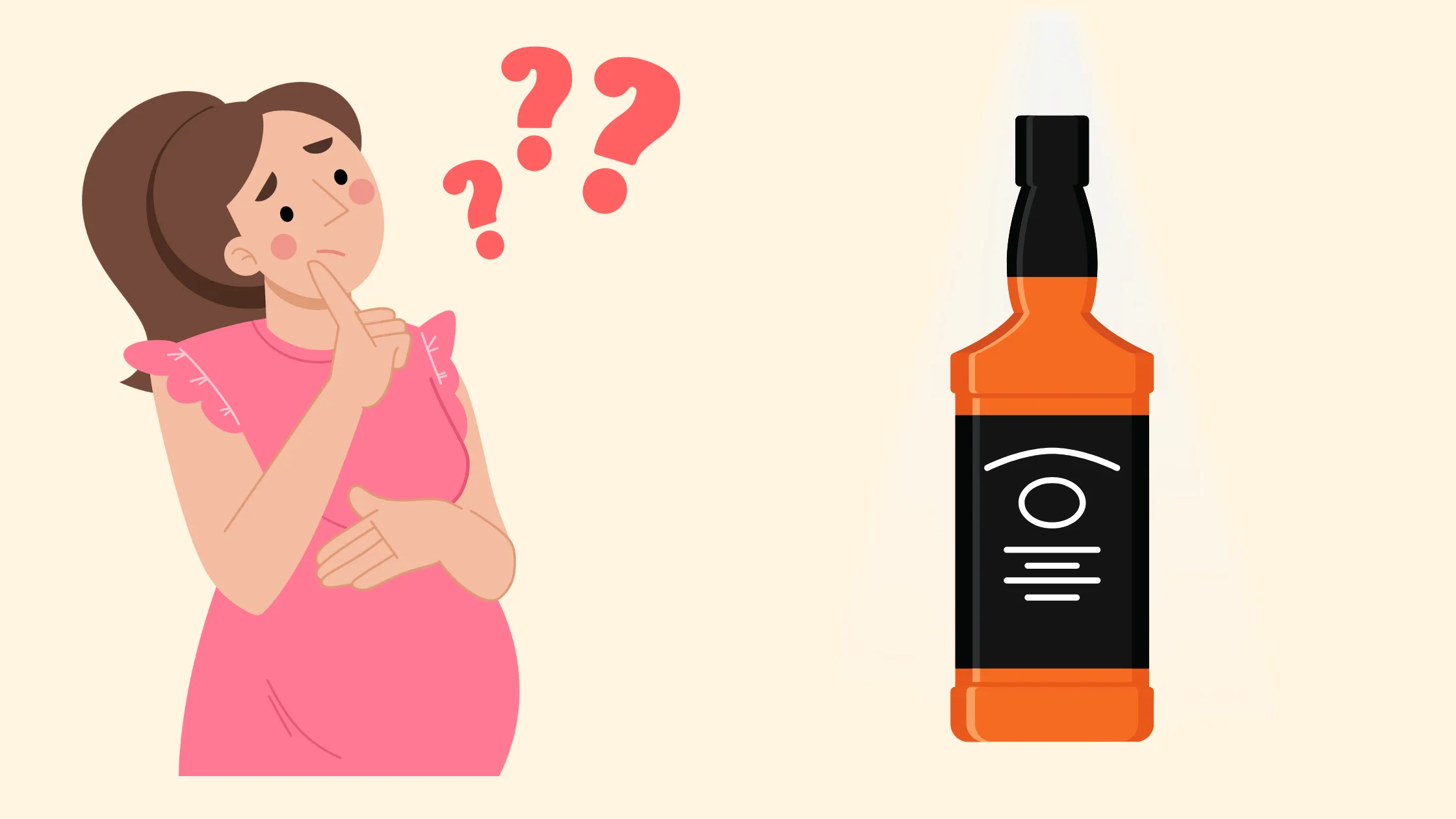If you’re expecting and find yourself missing the cozy warmth of a whiskey cocktail, you’re not alone. The question of whether pregnant women should indulge in a sip of whiskey is met with a firm no from the medical community, due to the undeniable risks alcohol poses to fetal development. But don’t fret!
The world of mocktails offers a delightful and safe alternative, allowing you to enjoy the complexity and ritual of your favorite whiskey drinks without any harm to your baby. This article dives into why whiskey is a no-go during pregnancy, the impact of alcohol on fetal development, and the joy of mocktails. We’ll explore how to craft whiskey-flavored mocktails that mimic the rich, smoky essence of your preferred spirits and introduce you to a variety of alcohol-free versions of classic whiskey cocktails.
Whether you’re craving an Old Fashioned, a Whiskey Sour, or a Mint Julep, we’ve got you covered with mocktail recipes that promise to satisfy your taste buds. So, grab your non-alcoholic bitters and get ready for a dive into the world of sophisticated, safe sipping for expectant mothers.
What is the stance on pregnant women drinking whiskey?
The prevailing medical consensus strongly advises against pregnant women consuming whiskey or any other form of alcohol during pregnancy. This recommendation is rooted in a wealth of research indicating that alcohol consumption during pregnancy can lead to a range of adverse outcomes for the unborn child. These include fetal alcohol spectrum disorders (FASD), which encompass a variety of developmental, cognitive, and behavioral problems, as well as physical birth defects.
Alcohol, including whiskey, can easily cross the placenta, and because the fetus’s body is less equipped to process alcohol, its exposure can lead to serious health issues. The critical stance against drinking whiskey during pregnancy is based on the principle of minimizing risks and ensuring the best possible health outcomes for both the mother and the child. Given the risks, the safest course of action recommended by health professionals is complete abstinence from alcohol throughout pregnancy.
This guidance is aimed at eliminating any potential harm to the developing fetus, as no known level of alcohol consumption has been proven to be safe during pregnancy.
Why should pregnant women avoid whiskey?
Pregnant women are advised to avoid whiskey due to the significant risks it poses to fetal health. Alcohol’s ability to cross the placenta means that it can have direct and detrimental effects on the unborn child. These effects include the risk of fetal alcohol spectrum disorders (FASD), which are a group of conditions resulting from prenatal alcohol exposure that can cause lifelong physical, behavioral, and intellectual disabilities.
Additionally, alcohol consumption during pregnancy is linked to impaired brain development in the fetus, further underscoring the importance of abstaining from whiskey and other alcoholic beverages during this critical period. The American College of Obstetricians and Gynecologists and other health authorities underscore the importance of a zero alcohol tolerance during pregnancy, highlighting that no amount of alcohol has been proven safe at any stage of pregnancy. Legal and medical guidelines converge on this point, advocating for complete avoidance as the only guaranteed way to prevent alcohol-related harm to the fetus.
This collective stance is driven by a commitment to ensuring the safest possible environment for fetal development and the well-being of both mother and child.
Alcohol’s effects on fetal development
Alcohol consumption during pregnancy can severely impact fetal development. When alcohol crosses the placenta, it can hinder the growth and development of the fetus’s organs, leading to a range of physical and developmental issues.
Risk of fetal alcohol spectrum disorders (FASD)
FASD encompasses a variety of conditions arising from prenatal alcohol exposure. These conditions can result in physical abnormalities, cognitive impairments, and behavioral problems, highlighting the critical need for pregnant women to abstain from alcohol.
Impaired brain development
Exposure to alcohol in utero is linked to significant impairments in brain development. This can lead to learning difficulties, attention deficits, and other cognitive issues, underscoring the importance of avoiding alcohol during pregnancy.
Legal and medical guidelines
Both legal and medical guidelines strongly advise against alcohol consumption during pregnancy. These guidelines are based on extensive research demonstrating the risks associated with prenatal alcohol exposure and aim to protect the health and well-being of both mother and child.
American College of Obstetricians and Gynecologists’ advice
The American College of Obstetricians and Gynecologists explicitly recommends a zero alcohol tolerance policy during pregnancy. This advice reflects the consensus among healthcare professionals that no level of alcohol is safe during any stage of pregnancy.
Zero alcohol tolerance during pregnancy
Adopting a zero alcohol tolerance policy during pregnancy is the safest approach to prevent alcohol-related harm to the fetus. This stance is supported by a wide array of medical and legal authorities and is essential for ensuring the healthiest possible outcome for both mother and baby.
What are mocktails?
Mocktails are alcohol-free cocktails designed to mimic the complexity and enjoyment of traditional cocktails without the inclusion of alcohol. They offer a safe and delightful alternative for those who choose or need to avoid alcohol, such as pregnant women. By incorporating a variety of ingredients like fresh juices, herbs, spices, and non-alcoholic bitters, mocktails provide a sophisticated and enjoyable drinking experience.
For example, a Whiskey-Free Old Fashioned can be crafted using non-alcoholic bitters blended with a tea syrup that offers a smoky sweetness, closely replicating the depth and complexity of its alcoholic counterpart. Similarly, a No-Whiskey Sour utilizes lemon juice, simple syrup, and aquafaba to achieve the classic’s tartness and smooth texture without any alcohol. This makes them an excellent choice for ensuring inclusivity in social settings, allowing everyone to enjoy the ritual of shared drinks without compromising health or personal choices.
Alcohol-free cocktails
Alcohol-free cocktails, commonly referred to as mocktails, are ingeniously crafted to emulate the rich taste and intricate complexity of traditional cocktails, but without any alcohol. These beverages serve as an ideal choice for individuals looking to partake in the social and culinary pleasures of cocktail consumption while abstaining from alcohol for health, personal, or religious reasons. By skillfully combining a variety of fresh juices, aromatic herbs, exotic spices, and non-alcoholic substitutes for traditional spirits and bitters, mocktails offer a sophisticated and inclusive drinking experience.
Popular mocktail versions of whiskey cocktails include the Non-Alcoholic Mint Julep, made with mint leaves, simple syrup, and a non-alcoholic spirit to capture the refreshing essence of the original. These alternatives are especially appealing to a broad audience, including pregnant women, ensuring that social events can be enjoyed by everyone, irrespective of their alcohol consumption preferences.
Why choose mocktails during pregnancy?
Choosing mocktails during pregnancy is a wise decision for several compelling reasons. Primarily, they are safe for fetal development, posing no risk of the adverse effects associated with alcohol consumption. This safety aspect ensures that expectant mothers can enjoy a variety of sophisticated and flavorful beverages without exposing their unborn children to the potential harm of alcohol.
Furthermore, mocktails eliminate the risk of fetal alcohol spectrum disorders (FASD), a critical consideration for any pregnant woman. They also cater to the common craving for unique and complex flavors, providing a satisfying alternative to alcoholic drinks. By opting for mocktails, pregnant women can participate in social gatherings and celebrations without feeling excluded, enjoying the ritual of shared drinks in a healthy and inclusive manner.
Safe for fetal development
Mocktails provide a safe option for fetal development, free from the risks associated with alcohol consumption. They allow pregnant women to enjoy a variety of beverages without worrying about potential harm to their unborn child, ensuring a health-conscious choice during pregnancy.
No risk of FASD
Choosing mocktails means expectant mothers completely eliminate the risk of fetal alcohol spectrum disorders (FASD). This crucial decision supports the health and well-being of the baby, ensuring a safer pregnancy outcome and fostering a healthy start in life.
Satisfies cravings without alcohol
Mocktails serve as an excellent way for pregnant women to satisfy cravings for sophisticated drinks without resorting to alcohol. They offer a way to enjoy the social aspect of drinking and the pleasure of diverse, rich flavors without the associated risks, making them a perfect choice for maintaining a vibrant social life safely.
Offers complex flavors
Designed to offer complex flavors, mocktails mimic the depth and variety found in alcoholic cocktails. This allows pregnant women to explore a range of tastes and enjoy the experience of drinking cocktails safely, ensuring that the enjoyment of culinary delights remains a part of their lives during pregnancy.
How to create whiskey-flavored mocktails?
Creating whiskey-flavored mocktails involves using ingredients that mimic the rich, complex flavors of whiskey without containing alcohol. Black tea serves as an excellent base, offering a smoky depth similar to that of whiskey. Non-alcoholic bitters add complexity and an aromatic dimension to the drink, enhancing its flavor profile.
For those seeking an even closer approximation to whiskey’s unique taste, non-alcoholic whiskey alternatives are available on the market, formulated to replicate the distinctive notes of whiskey. Brands specializing in these alternatives often use natural ingredients and processes to achieve flavors that resemble traditional whiskey, making it possible to enjoy whiskey-themed mocktails that are both safe for pregnant women and satisfying for anyone looking to reduce their alcohol intake.
Ingredients that mimic whiskey’s flavor
To craft a whiskey-flavored mocktail, a variety of ingredients can be employed to mimic the distinct, rich taste of whiskey. These include natural elements that replicate the smoky, full-bodied, and complex profile of traditional whiskey, offering a satisfying alternative for non-drinkers.
- Black tea for a smoky base
- Non-alcoholic bitters for complexity
- Caramel syrup for sweetness and depth
- Apple cider vinegar for a hint of acidity that mimics whiskey’s sharpness
Brands offering alcohol-free whiskey flavors
Several brands specialize in producing alcohol-free whiskey flavors, utilizing natural ingredients and innovative techniques to replicate the unique characteristics of whiskey. These alternatives provide a safe and enjoyable option for whiskey enthusiasts looking to avoid alcohol, making it possible to indulge in the whiskey experience without compromise.
| Brand | Product Name | Flavor Notes | Availability |
|---|---|---|---|
| Seedlip | Spice 94 | Aromatic spices & citrus peels | Online & select retailers |
| Lyre’s | American Malt | Vanilla & toasted nuts | Online & select retailers |
| Ritual Zero Proof | Whiskey Alternative | Smoky & sweet, with a hint of spice | Online & select retailers |
| Monday | Non-Alcoholic Whiskey | Oak & caramel, with a smoky finish | Online & select retailers |
Popular whiskey cocktails and their mocktail versions
The world of whiskey cocktails is rich with classic and beloved drinks, each offering a unique blend of flavors and experiences. For those seeking alcohol-free alternatives, many of these popular whiskey cocktails have been reimagined as mocktails, allowing everyone to enjoy their complex flavors without alcohol. From the Old Fashioned to the Whiskey Sour and Mint Julep, there are non-alcoholic versions that use clever ingredient substitutions to capture the essence of the original cocktails.
These mocktail versions utilize ingredients like non-alcoholic bitters, tea syrups, lemon juice, simple syrup, and non-alcoholic spirits to mimic the taste profiles of traditional whiskey cocktails. By doing so, they provide a satisfying and inclusive drinking experience for pregnant women, individuals abstaining from alcohol for health reasons, and anyone else looking to reduce their alcohol intake while still enjoying the ritual and pleasure of cocktail hour.
| Cocktail Name | Mocktail Version | Ingredients | Preparation |
|---|---|---|---|
| Old Fashioned | Non-Alcoholic Old Fashioned | Non-alcoholic bitters, tea syrup, orange twist | Stir 2 dashes of non-alcoholic bitters with 1 oz tea syrup over ice. Garnish with an orange twist. |
| Whiskey Sour | Non-Alcoholic Whiskey Sour | Lemon juice, simple syrup, aquafaba, non-alcoholic spirit | Shake 2 oz non-alcoholic spirit, 1 oz lemon juice, 0.5 oz simple syrup, and 1 oz aquafaba with ice. Strain into a glass and garnish with a cherry. |
| Mint Julep | Non-Alcoholic Mint Julep | Mint leaves, simple syrup, non-alcoholic spirit, crushed ice | Muddle mint leaves with 0.5 oz simple syrup in a glass. Fill the glass with crushed ice, add 2 oz non-alcoholic spirit, and stir. Garnish with mint sprigs. |
Old Fashioned
The Old Fashioned, a timeless whiskey cocktail, can be enjoyed without alcohol by substituting whiskey with a blend of non-alcoholic bitters and tea syrup. This combination closely replicates the classic’s depth and complexity, offering a sophisticated mocktail version.
Using non-alcoholic bitters and tea syrup
Non-alcoholic bitters and tea syrup serve as the foundation for crafting an alcohol-free Old Fashioned. The bitters add the necessary complexity, while the tea syrup introduces a smoky sweetness, mimicking the whiskey flavor.
Whiskey Sour
An alcohol-free Whiskey Sour can be created using lemon juice, simple syrup, and aquafaba. This combination ensures the mocktail maintains the original’s tartness and smooth texture, making it a refreshing and enjoyable alternative.
Lemon juice, simple syrup, and aquafaba
Lemon juice and simple syrup provide the sour and sweet balance characteristic of a Whiskey Sour, while aquafaba, the liquid from canned chickpeas, adds a silky texture similar to that of the egg whites used in traditional recipes.
Mint Julep
The Mint Julep, a beloved whiskey cocktail, can be reimagined without alcohol by using mint leaves, simple syrup, and a non-alcoholic spirit. This mocktail version captures the refreshing essence of the original, making it perfect for warm weather sipping.
Mint leaves, simple syrup, and non-alcoholic spirit
Mint leaves and simple syrup combine to replicate the Mint Julep’s refreshing sweetness, while a non-alcoholic spirit adds the necessary body and complexity, ensuring the mocktail remains true to the spirit of the classic cocktail. This improved section provides readers with specific recipes and preparation steps for creating non-alcoholic versions of popular whiskey cocktails, making it more practical and informative.
Tips for enjoying mocktails
Enjoying mocktails to their fullest potential involves a few key strategies that enhance their flavor, presentation, and overall experience. Enhancing flavor without alcohol is crucial; this can be achieved through the use of fresh ingredients, herbs, and spices that add depth and complexity to the drink. Experimenting with herbs and spices is particularly effective in creating a unique taste profile that can rival any alcoholic cocktail.
Additionally, the presentation and garnishes play a significant role in the enjoyment of mocktails; using traditional cocktail glasses and adding decorative garnishes can elevate the drinking experience, making it more enjoyable and visually appealing. Finally, using traditional cocktail glasses and decorations not only enhances the aesthetic appeal but also adds to the authenticity of the mocktail experience, making it comparable to enjoying traditional cocktails.
Enhancing flavor without alcohol
To enhance the flavor of mocktails without alcohol, focus on incorporating fresh, high-quality ingredients that can mimic or substitute the complexity and depth found in alcoholic beverages. Utilizing fresh fruit juices, homemade syrups, and infused waters can significantly elevate the taste of any mocktail.
Experimenting with herbs and spices
Experimenting with various herbs and spices offers an innovative way to introduce unique and complex flavors into mocktails. Ingredients like basil, mint, rosemary, cinnamon, and vanilla can transform a simple drink into a sophisticated, multi-layered beverage.
Presentation and garnishes
The presentation of mocktails is key to enriching the drinking experience. Using the right garnishes, such as fresh fruit slices, edible flowers, or aromatic herbs, not only enhances the visual appeal but also adds to the flavor profile of the drink.
Using traditional cocktail glasses and decorations
Serving mocktails in traditional cocktail glasses and adding thoughtful decorations can make the experience feel more authentic and special. Choosing the appropriate glassware for each type of mocktail, whether it be a highball, martini, or old-fashioned glass, adds a touch of elegance and ceremony to the enjoyment of alcohol-free beverages.
Enhancing flavor without alcohol: Techniques and Ingredients
| Technique/Ingredient | Description | Example Usage |
|---|---|---|
| Smoked Salts | Adds a smoky flavor reminiscent of whiskey or barbecued foods. | Rim the glass for a mocktail version of a Smoky Old Fashioned. |
| Homemade Syrups | Infused with spices or herbs, these syrups add depth. | Cinnamon or vanilla syrup for a sweet, aromatic twist in a mock Whiskey Sour. |
| Infused Waters | Water infused with herbs, spices, or fruit to add subtle flavors. | Rosemary or basil water for a refreshing, herbaceous note. |
Experimenting with Herbs and Spices: Pairings for Mocktails
| Herb/Spice | Flavor Profile | Mocktail Pairing |
|---|---|---|
| Basil | Fresh, slightly sweet | Non-alcoholic Gin and Tonic |
| Mint | Cool, refreshing | Mock Mint Julep |
| Rosemary | Piney, lemony | Non-alcoholic Whiskey Sour |
| Cinnamon | Warm, sweet | Mock Old Fashioned |
| Vanilla | Sweet, creamy | Non-alcoholic White Russian |
Presentation and Garnishes: Enhancing the Mocktail Experience
| Garnish | Visual Appeal | Flavor Contribution | Mocktail Example |
|---|---|---|---|
| Fresh Fruit Slices | Adds color and texture | Subtle fruitiness | Mock Sangria |
| Edible Flowers | Elegant, delicate appearance | Slight floral notes | Non-alcoholic Lavender Fizz |
| Aromatic Herbs | Fresh, vibrant look | Herbaceous aroma and taste | Mock Mojito |
Using Traditional Cocktail Glasses and Decorations: Elevating Mocktails
| Mocktail Type | Glass Type | Decoration Ideas |
|---|---|---|
| Mock Old Fashioned | Old Fashioned Glass | Orange twist, cherry |
| Non-alcoholic Martini | Martini Glass | Lemon twist, olive |
| Mock Mojito | Highball Glass | Mint sprig, lime wedge |





